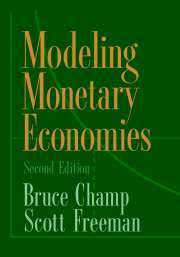16 - The Temptation of Inflation
from Part III - Government Debt
Summary
AN INFLATION unanticipated by the owners of nominal debt reduces the real value of that debt. Might a government therefore be tempted to rid itself of a burdensome national debt by inflating it away? If so, why would a potential bondholder ever trust the government not to inflate? To address these questions, this chapter examines the consequences of a default on the national debt and the temptation of the government to default. Then the chapter shows the equivalence of a surprise inflation to a default. Finally, it examines ways the monetary authority can convince the public that it will not give in to the temptation of inflation.
Defaulting on the Debt
If government debt crowds out capital and obliges the government to raise revenue just to pay the interest on the old debt, why put up with it? Why not simply default on the debt, refusing to pay it off? Certainly this is a tempting idea to any government that wants to lower taxes.
Suppose the government unexpectedly enacted a one-time default on the debt owed in period t. A look at the government budget constraint (Equation 13.8) reveals that this would enable the government to increase its expenditures, reduce taxes or seigniorage, or reduce the debt passed along to future generations. What would be the consequences of this default?
The most obvious consequence is that the default would redistribute resources from the generation that owned the initial debt to the generations that follow, who no longer need be taxed to pay the interest on the debt. In effect, therefore, the default functions like a tax on bondholders.
- Type
- Chapter
- Information
- Modeling Monetary Economies , pp. 288 - 306Publisher: Cambridge University PressPrint publication year: 2001



